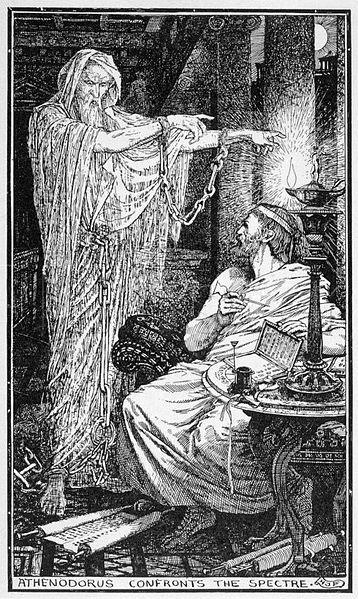Ghosts are back in. If they were ever out, that is. A recent article by Daniel S. Wise in Religion Dispatches asks “What Can a Real Life Haunting Tell Us about American Religion?” The fact that we can ask about such things without a smirk indicates, it seems to me, a new openness about the world. Wise isn’t trying to answer the question of whether ghosts exist or not, rather he’s parsing things a bit finer. The real question is how a haunting can inform us about American religion. Historians have demonstrated time and again that Americans have been open to occult influences from the beginning. Even Puritans. We’ve been caught up in the myth of the pursuit of the one pure religion, and since true religion was revealed long ago, our ancestors must not’ve allowed any religious hanky-panky. So the thinking goes.
In reality, people see and experience things they can’t explain. Unlike the standard scientific paradigm suggests, people are capable of distinguishing what’s normal from what’s not. Yes, people often mistake perfectly pedestrian events as supernatural sometimes. Ghost-hunters have to eat, too. But intelligent, educated people also sometimes can’t find a conventional answer. Those are the more interesting stories. Wise’s article focuses on just one family’s experience. It leads to what Wise calls “metaphysical religion.” This is what has been in this country from the beginning. Historians like Jon Butler and Catherine Albanese have explored this also. We’ve seen time and again that ignoring what people actually believe can lead to problems. That’s why the work that Wise is doing should be applauded.
Whether or not ghosts exist, they can control human behavior. That’s perhaps an enviable position. No matter whether rich or poor, female or male, black or white, the ghost immediately captures attention and awe. They represent knowing what we among the living can’t. As Wise points out, they can effect our behavior. Ghosts also cut across the religious spectrum. While many Christian denominations declare that ghosts can’t exist, it doesn’t stop believers from seeing or experiencing them. Sometimes it leads to many ghosts being considered demons. The only connection, theologically, is that both are incorporeal, but that’s a subject we’ve already addressed. Also earlier I posed the question of whether ghosts are monsters or not. By not fitting into our airtight materialistic world, I suppose they are by definition. If, however, it’s someone we know lingering to give us comfort or information, perhaps they will spur a religious response.

